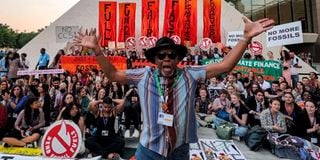COP28: Africa may leave climate meet empty handed amid stalemate

Climate activists attend a protest against fossil fuels during the United Nations Climate Change Conference COP28 in Dubai on December 12, 2023.
The African Group of Negotiators (AGN) at the global summit happening in Dubai has warned that the continent might walk home with nothing, and is now calling for a more concerted effort to alleviate the suffering of the millions who are living in the throes of climate change effect.
At a press briefing this morning, the negotiators insisted that adaptation financing “is a key issue for Africa”, and that “an outcome on the Global Goal on Adaptation (GGA) has been our key demand”.
“We will not agree on anything here unless Africa’s top priorities are met, which to us, is a GGA framework. If we are serious about saving lives, livelihoods and protecting ecosystems, then the GGA framework must have ambitious, time-bound targets with clear means of support for implementation,” Collins Nzovu, the Minister of Green Economy and Environment of Zambia and the Chair of AGN, said.
On the controversial matter of fossil fuel phase-out, he added any agreement on the same should be based on differentiated pathways, where African countries close the supply gap, rather than developed countries continuing to issue exploration licenses to avoid stranded assets as the African supply will be towards the global demand.
Africa holds six per cent of known global reserves of oil and gas and accounts for about 12 per cent of global production, and according to the Organisation for Economic Cooperation and Development (OECD), the continent is also the second largest exporting region, with 16 per cent of total exports.
These resources are crucial to Africa’s development as a means of earning foreign exchange and a positive balance of payments, and, therefore, significant concessional financial support for the continent’s transition is essential, said Mr Nzovu.
Dr Mithika Mwenda, the executive director for Pan African Climate Justice Alliance (PACJA), agrees with the AGN, saying “COP28 veered off the priorities for Africa right from the onset”, and that “the loss and damage pledges that came early at the opening ceremony were made to blow off the sail from the negotiations”.
“As this COP enters its dying moment, it is apparently clear that developed countries, who have frustrated Africa’s quest for fidelity to the Paris Agreement, are not making reference to our script. Their business interests sidestep the imperative of keeping global temperatures below 1.5C and creating a resilient globe, more so for communities in the front line.”
He lamented the lack of tangible outcomes that reflect Africa’s expectations and aspirations, especially on adaptation.
“We are disappointed by the lack of progress on the Global Goal on Adaptation and other serious issues of importance, such as finance and adaptation. We reiterate that, for Africa, adaptation is critical for implementation of the Paris Agreement as we are in a climate emergency because we are alarmed by the growing number of countries now in need of support to strengthen their adaptation. We need to see actions that are aligned to Africa’s adaptation priorities.”
However, Mr Majid Al Suwaidi, the director-general of COP28, appearing to disagree with the African sentiment, told the Nation that the summit has been focused on prioritising the most vulnerable communities that are grappling with the devastating impacts of climate change.
“This process has to serve the most vulnerable first, it has to deliver for those who contributed to the problem the least and have the least resources yet they are affected the most. This is why in our action agenda, the COP Presidency is keen on delivering real results,” he said.
On the criticism that the summit has been disappointing so far, especially after the release on Monday evening of the first draft of its negotiations document, Mr Suwaidi said the negative sentiment was expected.
“Lots of Parties felt it did not fully address their concerns. We expected that. In fact, we wanted the text to spark conversations, and that is what happened,” he said. “What we have seen since, is that the Parties have deeply held and deeply split views, especially on the language around fossil fuels. It is important to be clear on something. The text we released was a starting point for discussions. Again, this is entirely normal for a consensus-based process. When we released it, we knew opinions were polarised, but what we did not know was where each country’s red lines were.”
A revised version of the document was expected to be released by late Tuesday afternoon.





